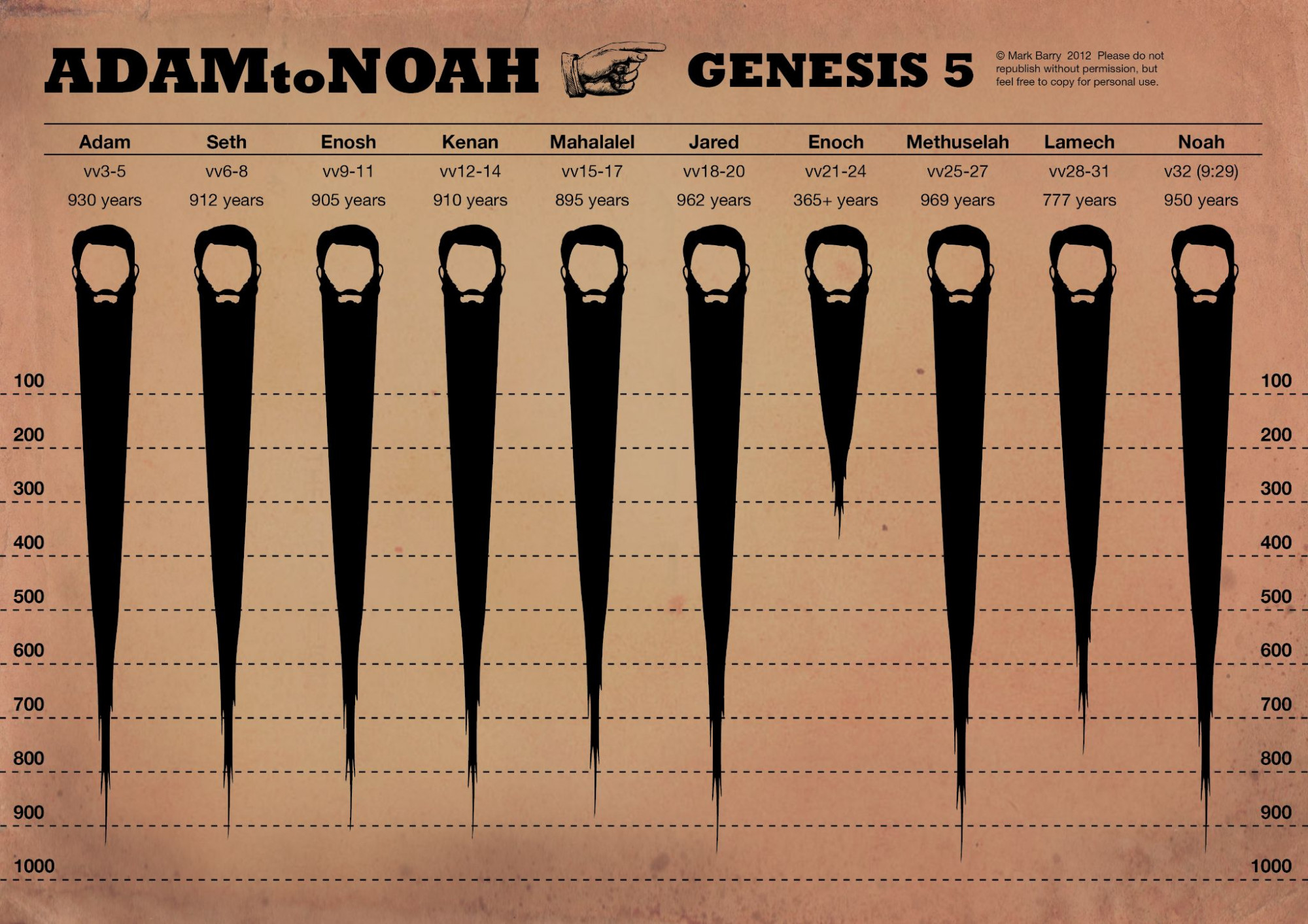
Scripture for the Day Sun, Oct 11th 2020: Need a Faith Builder? A Hidden Message in Genesis - WOW!
Devotional
Do you need a faith builder? Then today's Scripture might just help you with that.
Genesis 5 (KJV)
1 This is the book of the generations of Adam. In the day that God created man, in the likeness of God made he him;
At first glance, this brief chapter reads like a phone book. It's boring. Whenever we find such seemingly less inspiring passages, we should see it as a prompt to dig deeper. The English translations of the bible hide a secret that the Hebrew readers didn't miss. Genesis 5 is a prophecy of the coming of Christ.
How we have missed that? Because we read the Hebrew names of the patriarch transliterated, not translated. From Adam to Noah, every name has a meaning. Let's look at these closer. Even with a Hebrew dictionary available, we may not easily determine the meaning of the names, unless we look at the Hebrew root at the word.
Adam
Adam’s name means “man”. As the first man, that seems straight forward enough.
Seth
Adam’s son was named Seth, which means “appointed”. Eve said, “For God hath appointed me another seed instead of Abel, whom Cain slew.”[4]
Enosh
Seth’s son was called Enosh, which means “mortal, frail, or miserable”. It is from the root anash, “to be incurable”, used of a wound, grief, woe, sickness, or wickedness. It was in the days of Enosh that men began to defile the name of the Living God.[5]
Kenan
Enosh’s son was named Kenan, which can mean “sorrow, dirge, or elegy”. (The precise denotation is somewhat elusive; some study aids unfortunately presume that Kenan is synonymous with Cainan.)
Balaam, looking down from the heights of Moab, uses a pun upon the name of the Kenites when he prophesies their destruction.[6] We have no real idea as to why these names were chosen for their children. Often they may have referred to circumstances at birth, and so on.
Mahalalel
Kenan’s son was Mahalalel, from mahalal which means blessed or praise; and El, the name for God. Thus, Mahalalel means the “Blessed God”. Often Hebrew names include El, the name of God, as Dan-i-el, “God is my Judge”, etc.
Jared
Mahalalel’s son was named Jared, from the verb yaradh, meaning “shall come down”.[7]
Enoch
Jared’s son was named Enoch, which means “teaching, or commencement”. He was the first of four generations of preachers. In fact, the earliest recorded prophecy was by Enoch, which amazingly enough deals with the Second Coming of Christ (although it is quoted in the Book of Jude in the New Testament):
Enoch also, the seventh from Adam, prophesied of these, saying, “Behold, the Lord cometh with ten thousands of his saints,
To execute judgment upon all, and to convince all that are ungodly among them of all their ungodly deeds which they have ungodly committed, and of all their hard speeches which ungodly sinners have spoken against.”
— Jude 14–15
Methuselah
Enoch was the father of Methuselah, who we have already mentioned. Enoch walked with God after he begat Methuselah.[8] Apparently, Enoch received the prophecy of the Great Flood, and was told that as long as his son was alive, the judgment of the flood would be withheld. The year that Methuselah died, the flood came.
Methuselah comes from muth, a root that means “death”;[1] and from shalach, which means “to bring”, or “to send forth”. The name Methuselah means, “his death shall bring”.[2]
Methuselah’s father was given a prophecy of the coming Great Flood, and was apparently told that as long as his son was alive, the judgment of the flood would be withheld; but as soon as he died, the flood would be brought or sent forth.
(Can you imagine raising a kid like that? Every time the boy caught a cold, the entire neighborhood must have panicked!)
And, indeed, the year that Methuselah died, the flood came.[3]
It is interesting that Methuselah’s life, in effect, was a symbol of God’s mercy in forestalling the coming judgment of the flood. Therefore, it is fitting that his lifetime is the oldest in the Bible, speaking of the extensiveness of God’s mercy.
Enoch, of course, never died: he was translated[9] (or, if you’ll excuse the expression, raptured). That’s how Methuselah can be the oldest man in the Bible, yet he died before his father!
Lamech
Methuselah’s son was named Lamech, a root still evident today in our own English word, “lament or lamentation”. Lamech suggests despairing.
(This name is also linked to the Lamech in Cain’s line who inadvertently killed his son Tubal-Cain in a hunting incident.[10])
Noah
Lamech, of course, is the father of Noah, which is derived from nacham, “to bring relief or comfort”, as Lamech himself explains in Genesis 5:29.
That’s rather remarkable:
| Hebrew | English |
| Adam | Man |
| Seth | Appointed |
| Enosh | Mortal |
| Kenan | Sorrow; |
| Mahalalel | The Blessed God |
| Jared | Shall come down |
| Enoch | Teaching |
| Methuselah | His death shall bring |
| Lamech | The Despairing |
| Noah | Rest, or comfort. |
Man (is) appointed mortal sorrow; (but) the Blessed God shall come down teaching (that) His death shall bring (the) despairing rest.
This is evidence of DESIGN. The bible is an integrated message system from outside our dimension and time domain.
There are many more of these divine revelations hiddlen in the bible. Only a careful study will reveal these faith-building gems to us. To me, it is one of the proofs that Jesus is Who He said He is.
May Jesus bless you.
Source: Dr. Chuck Missler Koinonia House
- ·
- · yack69014

- ·
- · unknown

